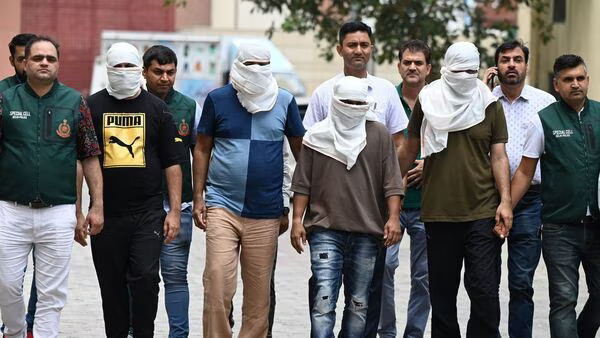On June 18, Delhi police officials confirmed the successful joint operation conducted by the Delhi Police Special Cell, the Federal Bureau of Investigation (FBI), and Interpol. Together, they brought down a call centre gang operating in India, which defrauded US citizens of $20 million. The gang posed as senior officials from the US Drugs Enforcement Administration (DEA).
In this international operation, six individuals have been arrested. Four of them were detained in India, including one from Uganda and one from Canada.
The arrested individuals in India are identified as Vatsal Mehta, Parth Armarkar, Deepak Arora, and Prashant Kumar. Mehta is believed to be the mastermind behind the scheme, while Armarkar supervised call centres in India and Uganda. The gang used the persona of Uttam Dhillon, a senior DEA officer, to approach potential victims.
According to HCS Dhaliwal, Special Commissioner of Police at the Delhi Police Special Cell, this coordinated action dispels the misconception that those responsible for transnational crimes can evade justice. He stated, “We received input from the FBI that an individual named Parther Marker defrauded several US citizens of more than 20 million dollars by posing as a senior Drug Enforcement Agency official. He was mainly operating from Uganda and Ahmedabad and other parts of India. He was arrested along with his criminal syndicate mastermind Vatsal Mehta and two of his associates.”
Dhaliwal explained that the callers would pretend to be Uttam Dhillon from the DEA and inform their targets that law enforcement on the US-Mexico border had discovered child pornography. The victims were coerced into making payments as penalties to avoid severe legal consequences.
The gang specifically chose affluent victims who were unlikely to report the scam to authorities. Dhaliwal said, “They would target moneyed people who were unlikely to report the matter to law agencies. Even if a victim did a cursory search on the Internet, they would find that there indeed is one Uttam Dhillon who has been an administrator in the DEA.”
The gang selected Uttam Dhillon as their impersonation target because he is a well-known attorney from the US and a former law enforcement official who served as the acting administrator of the Drug Enforcement Administration (DEA). This cover helped them deceive their victims.
Initially, the agencies suspected that Armarkar was leading the operation, but they later discovered that Mehta was the actual head of the gang. During the joint operation, the agencies first apprehended Armarkar, which led them to detain Mehta and their two main associates.
According to a senior police official, “He (Armarkar) was operating his criminal activities mainly out of Uganda… he also ran some part of his activities from different jurisdictions of India in assistance with his international co-conspirators.”
The officer claimed that recently, Armarkar called a target from India and requested gold bars as a penalty instead of money. The officer added, ” No matter in which US state the target lived, the gang would ensure that someone collected the money.” The police statement confirmed, “As part of coordinated action, the FBI has interviewed over 50 people so far and also collected evidence of fraud of more than 20 million USD which will be produced in court as per procedure.”
Dhaliwal emphasized, “This is not a scam in which someone is robbed of 200-300 dollars by a software bug. Here, they have targeted over 1 lakh dollars per victim. They would profile their targets after scanning their social media accounts. For example, people who were not very tech-savvy or lonely. They had several parameters.”
Dhaliwal also anticipated that many more victims would come forward, stating, “It is a fact that many people consume child pornography on the Internet. They (the gang) would use the dark net to find people visiting pornographic sites for their voyeuristic pleasures. So the targets would be vulnerable; they would think that they had indeed visited these sites and possibly law agencies are onto them. So, they would try to avoid trouble by paying up through cryptocurrency or wire transfers.”
The police statement confirmed that the four arrested individuals are facing charges under various sections of the Indian Penal Code (IPC). These include sections 419 (cheating done by impersonation), 420 (cheating), 384 (extortion), 120B (criminal conspiracy), 34 (acts by many in furtherance of common intention), as well as sections 66C (identity theft) and 66D (impersonation) of the IT Act.


















Comments